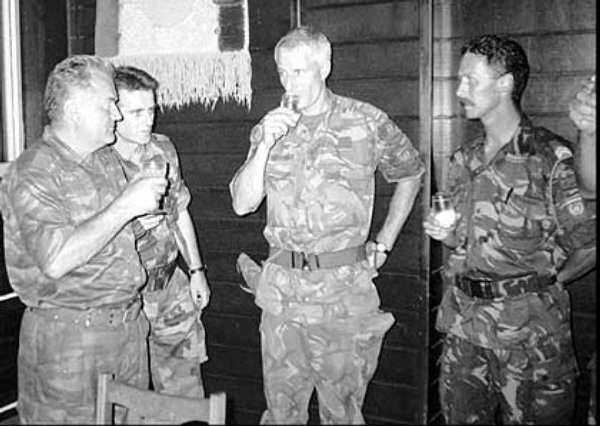Dutch Officials Face Lawsuit for Srebrenica Genocide
Institute for the Research of Genocide Canada
Published: July 9, 2010

Bosnian Serb army Commander General Ratko Mladic, left, drinks a toast with Dutch UN Commander Tom Karremans, second right, while others unidentified look on in village of Potocari, some 5 kilometers north of Srebrenica Wednesday, July 12, 1995, during the Srebrenica genocide.
Proceedings Against Dutch Officials
Relatives of some of the 8,000 men and boys murdered in the Bosniak enclave of Srebrenica in 1995 have started legal proceedings for genocide and war crimes against three Dutch military officials.
The enclave was under the protection of Dutch soldiers (Dutchbat) serving with the UN when attacked by Bosnian Serbs.
Now, four relatives have begun proceedings against commander Thom Karremans, his deputy Rob Franken and second in command Berend Oosterveen for failing to protect their loved ones. The charges were filed by Hasan Nuhanovic, who lost his parents and younger brother in the massacre, and Mehida, Damir and Alma Mustafic, the widow and children of victim Rizo Mustafic.
‘Karremans, Franken and Oosterveen may not have been able to predict the genocide but they did know of the deeply rooted hatred of Muslims and about earlier executions [that Serbs had committed against Bosniaks around Srebrenica starting three years before the genocide and onwards],’ the court document said.
Proceedeings Against United Nations
Meanwhile, in anotherproceedings brought by the 6,000 family members and relatives of the victims of the Srebrenica genocide (known as the ‘Mothers of Srebrenica’) against the State of The Netherlands and the United Nations, we have submitted an appeal in cassation at the Dutch Supreme Court (Hoge Raad) against the ruling of the Court of Appeals (Gerechtshof) in The Hague. In its ruling of March 30th 2010, the Court of Appeals upheld the UN’s immunity from prosecution even in this extraordinary case.
The Mothers of Srebrenica are of the opinion that the UN, as the international human rights champion, should not stand above the law but should take responsibility for its role in the Srebrenica genocide in 1995. Despite the fact that, already in 1946, the UN took on the obligation to create effective legal remedies, it has not yet met this obligation. This is a violation of fundamental human rights and in contravention of the case law of the European Court for Human Rights (ECHR) and the European Court of Justice (ECJ).
We are now also requesting the Dutch Supreme Court to submit the matter to the ECJ in Luxemburg. The question whether the UN enjoys absolute immunity for prosecution, even in a matter concerning the gravest violations of human rights, is of a principle nature when considering fundamental rights within the Euopean Union. One of these fundamental rights is, after all, the right of access to a court of law and to effective legal remedies. The final decision on this matter lies with the ECJ.
The UN has repeatedly stated to be bound by human rights, but apparently considers itself not bound in this particular case and has not even appeared in the proceedings. In addition the political question remains: How long can the UN retain credibility as an organisation for the protection of human rights if it does not not itself honor these rights?
The consequence of the ruling of the Court of Appeals in the Hague and the previous ruling of the Dutch District Court of The Hague is that the UN is not subject to any form of judicial control. The UN would thus enjoy absolute power. If this ruling is upheld, human rights are deemed subordinate to this absolute power. That is unacceptable from a political, humane and legal perspective.
For additional information about the proceedings against the UN and The Netherlands (including the writ of cassation), click here.

